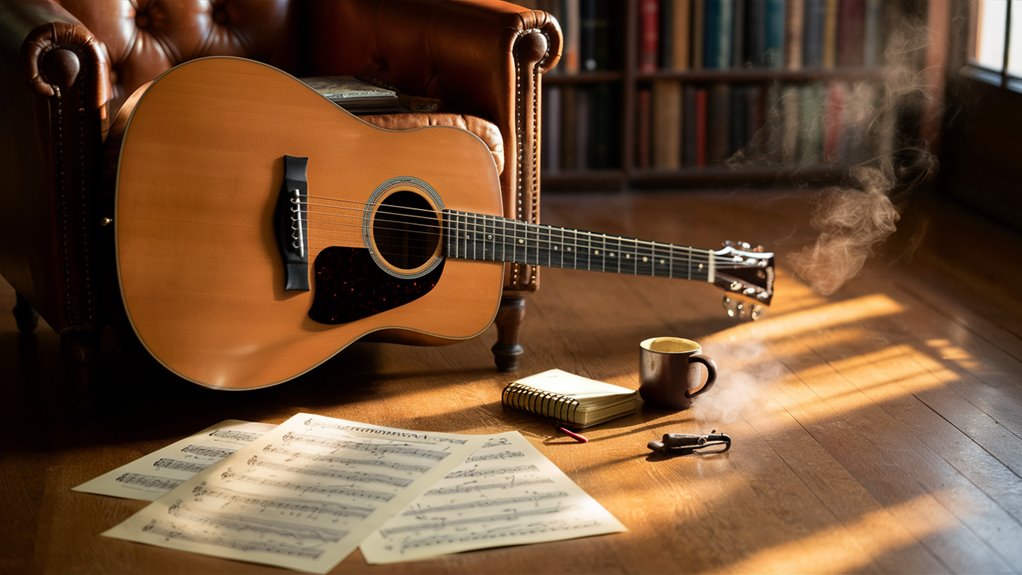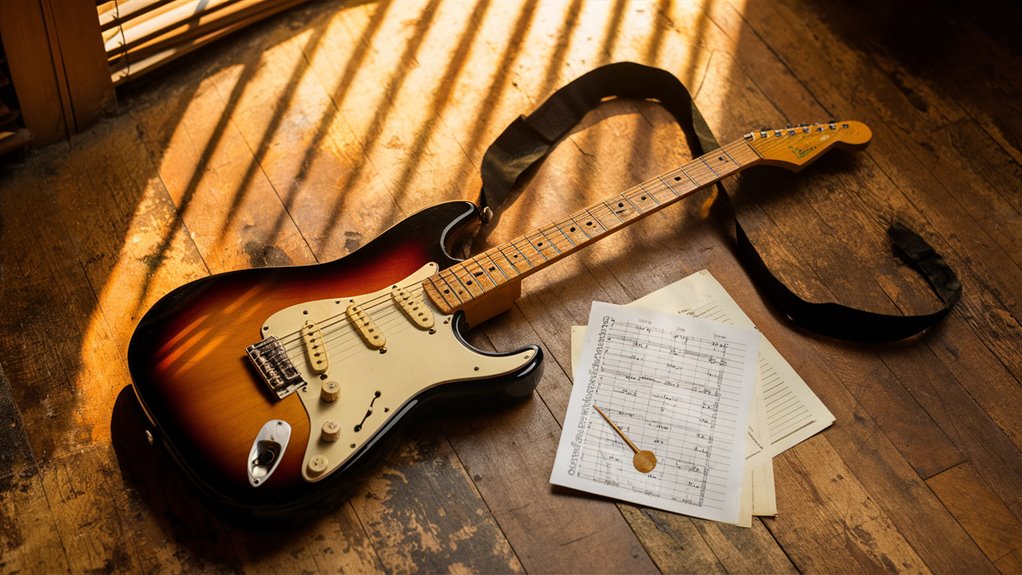Must-Try Rock Ballads That Are Easy to Nail

Want to get good at your first rock ballads? These big hits are great for new musicians, with nice tunes and easy chords.
Must-Learn Songs for Starters
“Every Rose Has Its Thorn” by Poison is a top pick, with a easy four-chord flow that goes on and on. Also, “More Than Words” by Extreme is good for learning how to play on your own with a clear, simple setup.
Big Beatles Songs
The Beatles have two top songs for new players. “Yesterday” has a soft tune good for singing practice, while “Let It Be” uses easy piano chords that work great on guitar or keyboard Know which timeless karaoke
Folk-Rock Starts
Bob Dylan’s “Knockin’ on Heaven’s Door” is loved by newbies for its same old chorus and easy build. Cat Stevens’ “Wild World” keeps a good steady pace, helping new players get timing and singing right.
Grow Your Skills
These rocking tracks are key steps before trying harder power ballads. Each song teaches key moves:
- Easy chord changes
- Keeping the beat
- 이 가이드에서 자세한 정보 확인하기
- Strong singing
- Being sure on stage
- Getting the song right
Know these top hits well to have a firm base in rock.
Power Ballads for Starters
Power Ballads for Starters: All You Need to Know
What Makes Power Ballads Tick
Power ballads rely on three big things: high singing, deep words, and big music jumps.
Key songs like “Every Rose Has Its Thorn” and “I Don’t Want to Miss a Thing” show these through planned, easy setups great for new folks.
Learn How to Sing Them
Start good singing habits with the verse parts, where slow, soft singing builds key breath skills.
Know how drama builds up in a song – map from quiet to loud parts to get these big songs right.
Get Better at Singing
Using different singing parts is big in power ballad singing. Work on moving smoothly between low voice and high voice, seen in songs like “Nothing Else Matters”.
The music often starts small then goes full, needing spot on singing and feeling to match these big changes.
Know the Music
Work on timing by looking into the music that backs you up – many power ballads start with just a piano or guitar before everyone joins in.
This build-up sets the stage for strong, moving singing that makes these songs hit hard.
No Need for Perfect Pitch
No Need for Perfect Pitch: Sing Rock Right
How Pitch Works in Rock
Perfect pitch isn’t needed to belt out great rock ballads.
Many top rock singers win fans through good pitch use and raw power over thin perfection.
The trick is knowing and using your natural voice best.
Key Singing Moves
Matching pitch gets better with practice.
Use a piano or guitar to find where your voice fits best and keep it even.
Listen back to recordings to spot what you need to work on.
Build Musical Trust
Start with easy tunes and move up as you get them down.
New tools that check pitch give feedback to get even better.
Rock digs deep honesty – huge stars like Bob Dylan and Kurt Cobain show that real feel often beats perfect notes in stirring the soul.
Main Points to Focus On:
- Work on matching pitch
- Know your voice limits
- Keep working on pitch
- Show real feeling
- Keep true in your show
Rock singing is about true feelings and being yourself. Build solid skills while letting what makes you special shine to win hearts.
Simple Yet Memorable Songs
Simple Yet Memorable Songs: Classics That Last

Why Simple Songs Stick
Across rock history, the long-lasting tunes and hits stick to simple tunes and chords that touch the heart.
Tracks like “Every Rose Has Its Thorn” by Poison and “More Than Words” by Extreme show how simple four-chord mixes can make songs that last for ages.
Songs on Guitar for Newbies
Pink Floyd’s “Wish You Were Here” is a lesson in easy songwriting, with repeating parts that build core skills. Going from verse to chorus feels natural, helping new players learn well.
“Wild World” by Cat Stevens is a top mix of easy pace and clear chord moves, great for guitarists moving up.
Songs for Singers
The top rock tunes mostly have singing in a doable range, great for new singers.
“Sweet Child O’ Mine” by Guns N’ Roses and “Dream On” by Aerosmith show how big singing can come from controlled skill over being too fancy. These tracks are top practice spots for vocalists wanting to find their own style while getting better at the basics.
What Makes Songs Stick:
- Simple chords
- Repeating tunes
- Easy singing range
- Deep words
- Steady song flow
Starting with Singing
Starting with Singing: Key Skills for Newcomers
How to Breathe Right
Diaphragmatic breathing is the base for good singing.
Lie down, put one hand on your chest and one on your belly. Try to make your belly move while your chest stays still.
This first step gets you ready for strong, steady singing.
Choosing Songs and Finding Your Voice
Singing naturally is key to getting better.
Pick songs like classic rock ballads “Every Rose Has Its Thorn” or “More Than Words.”
These let you focus on how to sing well without pushing your voice too hard.
How to Stand and Sing
Stand right to sing well: feet apart as wide as your shoulders, knees a bit bent. Keep your shoulders loose and your back straight.
How you stand affects how you sound. Use a mirror to check your stance and relax any tight spots.
Warm Up Before Singing
Start each singing time with warm-up tasks:
- Do vocal sirens to get your range going
- Work on scales to keep pitches right
- Do lip trills to ease face muscles
Tips for Your Voice
- Drink lots of water
- Skip dairy before you sing
- Record yourself to see how you’re doing
- Check how you breathe and stay on pitch
- Practice often to keep getting better
By working these key singing methods step by step, newbies build a good base for more singing skills.
Build Up Your Rock Songs
How to Build Your Rock Songs List: A Full Guide
Start with Rock Ballads
Growing a list of rock ballads starts with smart song picks that fit your voice now.
Begin with well-known basics like “Every Rose Has Its Thorn” by Poison or “I Don’t Want to Miss a Thing” by Aerosmith – both have easy tunes and singing parts good for beginners.
Songs for Getting Better
Up your rock singing game with middle-level tracks like “Bed of Roses” by Bon Jovi or “November Rain” by Guns N’ Roses.
These power ballads help with key parts like:
- Keeping your singing even
- Show deep feeling
- Last long on stage
- Range of loud and soft
How to Practice Rock Singing
Know each rock ballad by using tracks to back you up, helping with timing and pitch.
Break songs into bits:
- Learn verses by themselves
- Get the chorus down
- Mix parts bit by bit
- Work on a song for two weeks
- Make sure each run-through sounds good
More Songs to Learn
Once you’ve got the main parts down, try harder songs that rock like “Still Loving You” by Scorpions or “Dream On” by Aerosmith.
Work on things like:
- Better breath skills
- Keeping pitches spot on
- Putting real feeling in your singing
- Record often to see how you’re doing
- Check yourself and get feedback
#rock #singing #musicians #shows #rockballads


